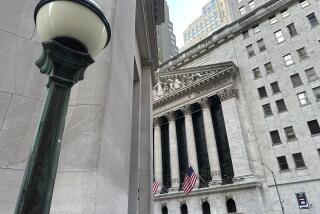Most of Wall Street rises, but indexes dip on Salesforce’s worst day in 20 years

NEW YORK — Most U.S. stocks rose Thursday following mixed profit reports from big companies and signals that the economy may be cooling, but the worst day for Salesforce’s stock in nearly 20 years helped drag indexes lower.
The Standard & Poor’s 500 sank 0.6% even though the majority of stocks across Wall Street rose. The Dow Jones industrial average fell 0.9%, and the Nasdaq composite dipped 1.1%.
Treasury yields eased in the bond market following weaker-than-expected reports on the job market and overall economy.
Salesforce lost a fifth of its value after reporting weaker revenue for the latest quarter than analysts expected. The cloud-based software company, which helps businesses manage their customers, is an influential stock on Wall Street indexes, particularly on the Dow. Salesforce also gave forecasts for revenue in the current quarter and fiscal year that fell short of Wall Street’s. Shares tumbled 21.3%.
Kohl’s fell even more, 23.3%, after reporting a surprise loss for the latest quarter when analysts were expecting to see a profit. The retailer said sales fell in the quarter from a year earlier as customers pulled back on clearance items. It cut its forecasts for sales and other financial targets this year because of the stumble.
Helping to support the market were better-than-expected profit reports from a range of companies. Best Buy topped forecasts even though its revenue fell short last quarter, and its stock rose 12.7%. Foot Locker ran 17% higher after likewise reporting better-than-expected profit despite ringing up sales shy of analysts’ forecasts.
Stocks also broadly got a boost from easing Treasury yields in the bond market. That helped most stocks on Wall Street to climb, and the smaller stocks in the Russell 2000 index rallied 1.1%.
The drop in yields offered relief after they had climbed this week on worries about tepid demand for Treasury bonds following several U.S. government auctions. Higher yields put downward pressure on all kinds of investments.
Yields fell Thursday after a couple of reports showed the U.S. economy isn’t quite as strong as expected. The hope on Wall Street is that the economy can cool down, but not by too much, so that the Federal Reserve can hit a precise landing where it gets high inflation under control without causing a bad recession.
One report showed more U.S. workers applied for unemployment benefits last week than expected, though the number of layoffs still remains low compared with history. Another suggested the overall U.S. economy’s growth may not have been quite as strong as earlier thought.
A slowdown in the economy could give the Federal Reserve more confidence that inflation is sustainably heading down to its 2% target. That in turn could convince it to cut the federal funds rate, which has been sitting at the highest level in more than two decades.
The yield on the 10-year Treasury fell to 4.55% from 4.62% late Wednesday. The two-year yield, which more closely tracks expectations for Fed action, fell to 4.92% from 4.98%.
The more important data point will probably arrive Friday, when the U.S. government offers the latest monthly update on a gauge of inflation that the Federal Reserve prefers to use. That report “could dominate market sentiment until next Friday’s jobs report,” said Chris Larkin, managing director, trading and investing, at E-Trade from Morgan Stanley.
Stubbornly high inflation earlier this year forced investors to push back repeatedly their forecasts for rate cuts this year, which proved way too optimistic.
Until then, the tail end of earnings reporting season could offer the main drivers for the market. Profits have largely been better than expected for the start of 2024.
Outside of Salesforce, other tech-related companies had warmer market receptions to their latest profit reports.
C3.ai jumped 20.3% after the software company topped expectations for profit and revenue in the latest quarter. HP gained 18.1% after edging past forecasts for earnings.
Many retailers are also reporting, as they usually do to close each earnings season, and scrutiny is high because of worries about cracks forming in the main engine of the U.S. economy, spending by U.S. households. Still-high inflation is hurting, particularly those making lower incomes.
Dollar General swung from gains to losses after beating profit forecasts and edging past expectations for revenue in the latest quarter. The retailer, which serve many lower-income customers, said it saw strong traffic growth at its stores through the quarter. The company also gave a forecast for profit over the full year that was in line with analysts’ expectations, but its forecast for this quarter’s fell short. Shares fell 7%.
Build-A-Bear Workshop tumbled 12.9%. The company, which lets customers build their own stuffed animals, reported worse drops in revenue and results for the latest quarter than analysts expected. The company said it had to contend with a “weaker spending environment” overall that dragged on its business.
In stock markets abroad, indexes rose modestly in much of Europe after struggling in Asia. Japan’s Nikkei 225 fell 1.3%, South Korea’s Kospi dropped 1.6% and Hong Kong’s Hang Seng sank 1.3%.
Choe writes for the Associated Press
More to Read
Inside the business of entertainment
The Wide Shot brings you news, analysis and insights on everything from streaming wars to production — and what it all means for the future.
You may occasionally receive promotional content from the Los Angeles Times.









